|
GREASE by Jim Jacobs and Warren Casey Our Lady's School Abingdon Radley Road, Abingdon, OX14 3PS 11-13 February 2020 This perennially popular production is hard not to like. It has a string of great songs that everyone knows (You're the One that I Want, Summer Nights, Hopelessly Devoted to You, Greased Lightning, We Go Together). It has the classic boy meets girl, boy loses girl, boy finds girl again plot line. It has a large cast and some great choreography.
Set in 1959 America at Rydell High School, the story follows the on-off romance between Danny and Sandy, stemming from a summer holiday romantic fling that turns out to be not that fleeting after all. Danny is the gang leader of the T-Birds. Their female counterpart at Rydell are the Pink Ladies, fronted by the gutsy, vampy Betty Rizzo. Into this world wanders new-girl-in-town Sandy, just starting at the school and unaware that her summer romance is a student there. When Danny meets Sandy there is delight from the latter but embarrassment from the former. Thus begins the series of twists and turns that eventually (inevitably?) see the couple reunited. Actually, could one be forgiven for thinking it's just an excuse for some great song, dance and humour? So how did director Elizabeth Lawson and her team do? Pretty well it turns out. Dr Lawson was gifted two talented leads in Freddie Lee as Danny and Sally Frandsen as Sandy. Lee's extraordinary vocal abilities will no doubt be sorely missed by OLA after he completes his 'A' Levels this summer. The combination of a great voice with the perfect pouty look as Danny Zuko gave the piece a strong central anchor. Frandsen caught the character of Sandy Dumbrowski well – an ingénue adrift in an alien and often hostile environment. Oh, and a strong vocal performance as well. As with previous musical productions at OLA, the restrictions imposed by a small stage and very large cast (over 70!), were mitigated by the use of a full-width balcony upstage. This use of split level staging during the bigger musical numbers enabled the production to punch above its weight with a striking 'big stage' visual impact. It was also a neat solution of where to put the show band when the venue lacked either a pit or suitable off-stage space. Congratulations to choreographer Miss Page for managing to bring dynamic movement to a full cast so tightly packed on stage that I've seen rush-hour Tube train passengers with more room to manoeuvre. If the cast can't move their feet, work those arms! The co-ordination was impressive. If there was a non-human star of the show, it was Kenickie's (Henry Turner) car Greased Lightning, which attracted its own round of applause from the audience. Wheeled on to stage with consummate ease by an invisible stage crew of black-clad ninjas, accompanied by blasts of stage smoke, the vehicle stood resplendent with flames painted along the side. Boy-racer-ness personified. Although the song 'Greased Lightning' was well sung, on the opening night performance the dance moves by the T-Birds were poorly co-ordinated. Thankfully this was a rare exception. Creating and sourcing costumes for such a large cast is a demanding task, but costumiers Grace Hummerston, Mrs Luscombe and Mrs Sharkey rose to the challenge with T-Birds, Pink Ladies, cheerleaders and assorted students, jocks and beauticians looking cool, hot, hip or frankly surreal, as required. In the latter category, I particularly enjoyed the costumes worn by the Beauty School Angels (massed curlers and gowns) during the number 'Beauty School Dropout'. The band played to a high standard, so it was slightly disappointing that some numbers appeared to use recorded music instead. It was not clear why this option was chosen, as there was clearly talent aplenty amongst the music stands. Finally, a few bouquets to performers who shone especially brightly on the night. Isobel Morris was an excellent Rizzo. Her nuanced performance of 'There Are Worse Things I Could Do' was a stand-out moment. Dominic Warburton as Roger gave a splendidly awkward rendition of 'Mooning', in which he confesses to Jan (Emma Samuels) about his cheeky hobby. We had a lovely deadpan performance of 'Beauty School Dropout' from Julian Kirby-Torres as Teen Angel. There were also notable performances from Brooks Frandsen as Doody the wannabe rock star and Carenza Danko as Eugene the nerdo supremo. One of the star turns was Imogen Harrison as Cha-Cha. Praise to Imogen and Freddie Lee for a pin-sharp dance performance of 'Born to Hand Jive'. Congratulations to cast and crew for a production that did justice to a very well known show and sent their audience away in a joyful mood.
0 Comments
PRIVATE LIVES by Noel Coward
Sinodun Players Corn Exchange, Market Place, Wallingford, OX10 0EG 17-20 July 2019 Private Lives is one of Coward's masterpieces. Witty and biting, set in an enchanted social world, the piece transports us to a place where words are what matter most. Although much of the text speaks of feelings, we get a decidedly attenuated range of emotions from the main characters. Whatever tragedies one may be living through, what matters is to offer it to the world as an aphorism or a humorous aside. It's not how we do things nowadays, of course. But, by golly, that man Coward had a way with words, and it is his use of the English language that keeps a play such as Private Lives in the theatrical repertoire almost 90 years after it was written. The plot of Private Lives is straightforward enough. Elyot and Amanda divorced five years ago and both have recently remarried. Each new couple has booked in for their honeymoon at the same French hotel. The new marriages are clearly creaking already, and when Elyot and Amanda bump into each other, on the hotel terrace, old passions are rekindled and they run away together, abandoning their new spouses. The remainder of the play takes place in Amanda's Parisian flat, where she and Elyot bicker and make up, then bicker and make up. Rinse and repeat. Victor and Sibyl, their abandoned spouses, turn up and demand to know what is going on. More bickering, fighting, spanking and witty repartee, followed by Elyot and Amanda slipping out of the flat to escape. So did Sinodun Players do justice to the piece in Marilyn Johnstone's production? The spare set of the opening act caught the sophisticated glamour of Coward's world. White, diaphanous curtains and four simple white blocks (doing service as tables and chairs), redolent of a set in a Busby Berkeley musical, took us to the terrace of the hotel. The thing about such a stylised set was that it made the posing that characterises the principals seem perfectly natural. Amanda's Paris flat was, by contrast, a busy place to be. It was a symmetrical, split-level set with enough furniture for the characters to drape themselves over, and no less than four doors (shining white against the blacks), but which did not end up crowding the stage. Congratulations to the set-building team for their work. The costumes were spot on, reproducing the glamour of the period. It's easy to imagine that all one needs for a piece of this period are dinner jackets and posh frocks, but it can be done well or poorly, and this was the former. Jay Aggett turned in a strong performance as Amanda; brittle, conflicted, and dancing on a knife-edge of emotion. Her assured stage presence provided us with an Amanda who was a satisfying foil to Elyot (Graham Watt) with his witty rapier-like attacks. The temptation with a Noel Coward play is to play the leading man like Noel Coward. In my opinion, this is something, generally, to be avoided. But such is the magnetic pull of The Master, that Graham's performance leant a little too much towards impersonation. Not that it wasn't done with competence. I just feel that he should have created something more his own. An enjoyable performance nonetheless, with good, understated delivery of some waspish lines. Amanda's husband Victor has really been had. He has married a woman that he is besotted with (out of his league even), but who does not love him in return (unless you redefine the meaning of the word as Amanda seems to do). Now she has run off with her former lover. Victor is outraged, offended, self-righteous, pompous and a bit pathetic. Will Lidbetter gave a lovely performance of a character that we, the audience, should feel sympathy for, but don't really. The physical contrast between the two actors (Graham and Will) reinforced this. Graham's tall, slim, languorous figure towered over Will's shorter, stockier physique that was beautifully puffed up when it needed to be. Natalie Davies was an equally distressed Sibyl who finds common cause with Victor. Tearful and confused, resentful and down-to-earth, Natalie's characterisation gave us a woman who was out of her depth in the sophisticated world of Elyot and Amanda, but still bloody annoyed at their behaviour and not afraid to say so. Finally, a brief mention of Jean Simmons' cameo role as Louise the French maid. Director Marilyn Johnstone efficiently employed her as a member of the stage crew. Louise came on at the beginning of the second act and moved round furniture and cleared up in character, playing it for laughs with stumbles, hacking coughs and the like. Better than watching the black t-shirt brigade. This was a thoroughly entertaining production of a modern classic. It remained true to the spirit of the play, delivering the wit and humour of Noel Coward with an assured touch. Congratulations to all concerned. 'ALLO, 'ALLO! By Jeremy Lloyd and David Croft Abingdon Drama Club (ADC) Unicorn Theatre, 18 Thames Street, Abingdon, OX14 3HZ 26-29 June 2019 The knockwurst, the Fallen Madonna with the Big Boobies, the ridiculous British airmen, the pantomime villain Herr Flick of the Gestapo, the camp Lieutenant Gruber and, of course, Rene Artois and the crew – they're all here. Wound up and ready to go for our entertainment and amusement. Director Terry Atkinson's production of this national favourite played it with a straight bat, aiming for the 'Allo, 'Allo! that we all know and love. Long story short, he succeeded. There was effective casting, especially with Michael Ward capturing the languid, laissez-faire attitude of Rene that we all recall from Gorden Kaye's original TV performance. Likewise, Lynne Smith proved an hilarious Edith with some quite deliberately awful cabaret singing. But it was a strong cast generally and ensemble playing was the key to the comedy. 'Allo, 'Allo! is a pantomime in all but name, but without the audience participation. Large, overdrawn two-dimensional characters that either play up to stereotypes or create some of their own – this is exactly what an audience intent on simple fun is looking for, and we were not disappointed.
In the programme notes, Atkinson was at pains to disassociate the production from any thought crimes because of the 'dated' humour. It's a sad sign of our times that he felt the need to do so. He needn't have worried. I think he overestimates the credence the general public ascribe to the phobias and isms that the majority of us are allegedly guilty of because of our genetics. Inventing a neologism does not make a thing true. Switching off from 'reality' and losing ourselves in farce, as Atkinson wisely suggests, actually brings out a deeper, greater human truth that transcends the shallow labelling exercise that currently threatens freedom of artistic expression. As with Shakespeare, being faithful to the text will take you a long way to success with this show, and the humour was played in the spirit in which Lloyd and Croft wrote it. Although the characters are well established, right down to the tiniest of nuances, that does not equate to a 'painting-by-numbers' approach by the actors. Craft and skill are still required. I particularly enjoyed Jon Crowley's Le Clerc, Tony Green's Lieutenant Gruber and Tim Mean's Crabtree. But the remainder of the cast all caught the essence of their characters pretty well. Michael Ward did a sterling job with set design, transforming the Unicorn Theatre into Cafe Artois with a layout that meant the stage never felt crowded. Costumes were excellent, although with the inevitable compromises: I chuckled at the fact that Captain Bertorelli's (Duncan Blagrove) hat was actually a tricorn hat. It had the requisite black feathers on it, you see. A nice feature during the many scene changes was the projection of tongue-in-cheek comments, in French, above the stage, such as 'not another scene change!'. Of course, you can get away with being ruder in a foreign language than in English; an opportunity that was not missed. On the evening I went, there was a full house of happy laughing customers. ADC have recently put on a number of more serious productions, tackling deeper subjects that I've enjoyed. This provided a contrast with straightforward popular entertainment and was none the worse for that. Photo credit: ADC ROMEO AND JULIET by William Shakespeare Dorchester-on-Thames Festival Dorchester Abbey 15-17 & 19 May 2019 This was a thoroughly enjoyable production of Romeo and Juliet, staged in the dramatic space of Dorchester Abbey. There were some excellent performances from the principals, but, before we go on, one criticism if I may. The stage was built far too low for most of the audience in unraked church pews to be able to see properly. I heard complaints and noticed a number of empty seats after the interval. Not good. Director Caroline Seed mitigated the problem to some extent with what would have been, in any case, a good use of the space for dramatic effect. The use of the entire length of the abbey’s long aisle for entrances played to good effect, particularly in the build-up to the fight scene between Mercutio (Elizabeth Dobson) and Tybalt (Alex Bristow). Likewise the door to the abbey’s cloister garden situated halfway along the aisle enabled the action to be moved away from the stage. The staging of the ball at chez Capulet (when our star-crossed lovers first meet) was less successful. The side chapel housing the shrine of St Birinus is a large space, but almost invisible to most audience members. The lighting design deserves mention, although lighting cues could have been a little sharper on the evening I attended. Vicky Goodall is to be congratulated on her costume design – combining sixteenth century dresses and tunics with rather a lot of motorcycle boots and Doc Martens. Not so much steam punk as renaissance punk? Well done to fight director Dean Forster for some thrilling set pieces. The best (because it was the biggest!) was the opening brawl between the Capulets and Montagues in the town square. There was excellent use of the deep stage and most of the combatants looked as though they really meant it. So to the principal performers. We were treated to a notable Juliet by Kelly Ann Stewart who brought, fire, passion and intelligence to the role. In many ways, Stewart provided the lynchpin around which other talented actors could revolve. She was well matched with Zach Morris’s impetuous, troubled Romeo. Mercutio was cast as a female role with Elizabeth Dobson playing it as a tomboy with a fondness for the local lads. It was a strong performance with zest and energy, and an obvious relish for the comedic aspects of this appealing character. Capulet (Juliet’s father) was given a confident swagger by Martin Eggleston. I also enjoyed Lorna Stevenson-Walker’s matriarchal performance as Lady Capulet. Her voluminous gowns put me in mind of Joyce Grenfell’s ‘Stately as a Galleon’. Maria Crocker made the most of the Nurse’s subversive humour and physical comedy, and was one of the strong points of the production. Likewise Richard Ward brought us an assured performance as Friar Lawrence as a slightly bumbling, avuncular figure whose best intentions lead to tragedy. Although I’m not sure I entirely believed that such a calm character would also mess about with dodgy potions.
Final mentions must go to James Cooper, a young actor who impressed me as Benvolio. Also to Alex Bristow whose Tybalt was not the out-and-out baddy who kills the well-loved Mercutio, but a slightly more nuanced character whose actions are driven as much by the family feud as by personal choice. Of course all the principals were battling for attention with that other fine performer, the abbey itself. The soaring vertical space of the ancient church cannot fail to impart drama to any production. One thing I learned was that the savvy members of the audience brought cushions with them to avoid numb derrieres from the hard wooden pews. That aside, this was an entertaining and visually striking production with two or three stand-out performances amongst the principals. Photo credits: Dorchester Festival THE 39 STEPS adapted by Patrick Barlow from a concept by Simon Corble and Nobby Dimon
AmEgos Theatre King Alfred's Academy Theatre, Portway, Wantage, OX12 9BY 11-13 April 2019 For some reason, I failed to see Patrick Barlow's comic adaptation of John Buchan's adventure story during its nine-year run in the West End. So I was delighted when Amegos Theatre presented me with the chance to do so. In this spoof tale of derring-do (inspired by Hitchcock's film version), all the characters are played by just five performers, sometimes with multiple roles in the same scene. Add to that Patrick Barlow's trademark removal of the 'fourth wall' (where the actors come briefly out of character to wrestle with recalcitrant props and so forth) and John Buchan's tale of action and intrigue becomes a very funny and inventive evening of entertainment. It was also very well cast. Richard Hannay (Rob Thorpe) meets the mysterious Annabella Schmidt (Helen Harrison) at the theatre. They go back to his place where she is murdered by an unknown assailant. In the process, Hannay stumbles across a dastardly plot by a foreign power to smuggle vital military secrets out of Britain. Hannay's adventures in trying to foil the plot take him up to the Scottish Highlands and back to the London Palladium, before the spies and plotters are unmasked. In the meantime, he is abducted by enemy agents (Bill Jestico and Martin Waymark), evades capture by the police, who believe him to be a murderer, and has a romantic encounter with Pamela Edwards (Sam Winskill), who wants to turn him over to the authorities until, that is, she discovers the truth... Director Lesley Phillips was fortunate in having five such talented performers. Rob Thorpe's rugged, unflappable, pipe-smoking Richard Hannay gave a well paced and understated performance. That's a good thing. It would have been easy to have hammed it up, to have succumbed to what Alan Ayckbourn calls 'waving from the train' at the audience. Rob showed the necessary discipline not to do so, presumably with the odd prod from the director. Sam Winskill gave us a petulant, feisty and sometimes perplexed Pamela. Her double act with Rob had the right chemistry about it. The will-they-won't-they scene where Hannay and Pamela realise that they have fallen in love with each other was played pitch perfect. Helen Harrison had only two major scenes. Based on what I saw, it is a pity that her talents were not used more in this production. Her first appearance as Annabella, the foreign beauty with a secret, was well judged without being over the top. Most remarkable was Helen's performance as a corpse, having to remain rigid, while draped across an armchair, for several minutes, until a very funny piece of business (I shan't spoil it) allowed her to relax. But Helen's best and funniest role was as Margaret the Scottish farmer's wife, who takes in Hannay while he is on the run from the police. She soon develops a schoolgirl-like crush on him. Her characterisation was beautifully drawn. There was some hilarious, frenetically energetic comic business with some suitcases, which had the audience in stiches. There was also a final, wistful look from the window, as Hannay runs off into the night, which was a masterful piece of comic timing, deservedly earning a laugh from the audience. Last, but by no means least, were Bill Jestico and Martin Waymark who played all the rest. They were credited in the programme as clowns. They were, as cricket fans might say, good all-rounders. They probably had the most fun of all the cast, playing an array of male and female roles, from travelling salesmen to Scottish landlady to master villain to policemen. The double act worked very well in the manner of a musical hall act. The physical contrast between the two helped here: Bill the stockier of the pair; Martin wiry and angular. As well as playing Hannay, Rob Thorpe also built the set. There was an inventive use of walk-in scenery on wheels. So one float was a box at the theatre. Trundled round 180º we were in Hannay's flat. Then there was the ingenious use of suitcases as pieces of furniture. My one criticism is that some of the scene changes in the first act could have been a little slicker. Patrick Barlow's script has all the promise of a very successful show, as evidenced by its long run in the West End. However, this is no plug-and-play production. The key component was a cast with a feel for comic timing and flow. Lesley Phillips chose well and directed her actors into delivering an accomplished evening of escapist comedy. MERELY UNIFORMS by Will Hazell
St Peter's Players Wolvercote Village Hall, Wolvercote Green, Wolvercote, Oxford, OX2 8BD 10-13 April 2019 Merely Uniforms is an ambitious play for several reasons. Firstly, it deals with big, serious subjects. Secondly, it has a large cast (over twenty) on a small village hall stage. Thirdly, it advertises itself as a comedy-drama; always a difficult genre to pull off successfully. How far did the resulting production match up to the high bar they'd set themselves? Actually, surprisingly well (with a number of caveats, of course). Will Hazell wrote and starred in this rather different take on the home front during the Second World War. It is an examination of the conflicts, rivalries and insecurities thrown up in a society engaged in total war, and how those external forces interact with the pre-existing social and emotional issues troubling individual characters. It also questions the nature of war itself and the tension between society, its institutions and the individual. Oh, and it also throws in some comedy as well. You understand my point about its being ambitious. It is 1944, and we are in the isolated village of Little Widdle, a community that prides itself on keeping the outside world at a distance. The trouble is, wartime has brought the outside world to the heart of the village in the shape of the Army, the RAF and the US Army. The village pub, the Angry Mallard, has been taken over by the armed forces, and fights and disorder have become the order of the day. Worse still, the outsiders have set up camp on the site of the village festival. This is an event that has taken place annually since the seventeenth century, and represents something very important about the identity and self-confidence of the village. The village committee, under the leadership of Mr and Mrs Caswalden (Andrew Churchill Stone and Yvonne Janacek), decide that something must be done. They hatch a cunning, albeit rather far-fetched, plot to sow conflict and division between the RAF and the US forces, in the hope that the resulting chaos will persuade their commanding officers to remove the troops from Little Widdle. In the end, the plan is successful but redundant, as D-Day intervenes, and all the armed forces leave for Normandy. The festival is saved, but everyone involved has learned something valuable about themselves and others. The main sub-plot of the play is the burgeoning romance between the awkward, bookish Private Harold Furze (Will Hazell) and Clementine Phillips, the village school teacher (Charley Middleton). Harold is a fish out of water in the Army: geeky, shy and incompetent when it comes to military duties. Somewhat naively, he is surprised that the Army is constricting his individuality! He confides these thoughts to Clementine. She in turn tells him of her cynicism about the war, her repulsion at the death... on both sides. Although these scenes between Harold and Clementine charted the growing together of the two lovers, they tended to be a bit preachy and seemed more taken up with delivering a message rather than revealing a relationship. Nevertheless, the strong performances of Will and Charley drove the scenes along, in spite of some shortcomings in the script. More successful, I thought, was the conflictual relationship between Harold and his fellow soldier Private George Gibbles (a terrific performance from Isaac Alcock). 'Gorgeous' George is permanently 'on the pull' with female military personnel and regards Harold as 'a posho'. They come from different worlds. Yet their reconciliation, thanks to their comrade Private Roger Rowlands (a nicely understated performance from Tony Bywaters), avoided cloying sentimentality. A simple handshake and a bit of embarrassed foot-shuffling delivered the punch of emotional truth. The one piece of high emotion that did work was from Clementine's father, Capt. Trevor Phillips (full praise to David Smith for his character's journey from stuffed shirt old buffer to tearful breakdown and back again). Capt. Phillips has always refused to speak about Clementine's late mother, who died in the First World War. Clementine is exasperated and resentful of her father's mute response whenever she raises the subject. Her father's refusal to divulge is driving them apart. It feels as though a part of her is missing, she confides to Harold. The dam breaks at the end of the play, as her father pours out his grief to Clementine, and she finally discovers how her mother was killed by enemy action, leaving the infant Clementine the sole survivor in a bombed-out building. Surrounding these serious matters was an array of more comic characters, providing light relief from the heavier material of the play. I particularly liked Jane Hemmings' performance as Lady Beatrice Ryder, who holds nightly parties for servicemen at her home, determined not to miss out on the delights of soldiers away from home. This was a well judged, enjoyable comic performance as a predatory Amazon. Her mother, Lady Petunia Ryder (Elizabeth Kirkham), is hardly less restrained in her picking the low-hanging fruit of sex-starved soldiers and airmen. Lady Beatrice's cousin Squadron Leader Frederick Swallow (Pete Drury) presented us with a Blimpish caricature of the British officer class: utterly out for himself and passing up no opportunity to bed young women. Pitted against him is US Army Major Billy Steelman (Sean Hazell), equally libidinous and confrontational towards his British counterpart. Their stand-up argument at Lady Beatrice's dinner party triggers the conflict between British and US service personnel that has been planned by the village committee. Co-ordinating a cast of more than twenty actors on a small stage was certainly a challenge for director Pete Welply, but he managed without ever making the place seem crowded. There was adroit use of upstage and downstage areas, especially in the scenes in the village pub. The set design was simple yet effective, and scenery changes were mostly carried out efficiently in the time available (although not always terribly quietly!). This was a difficult and, in many ways, complex, play to stage, but Pete Welply achieved a production that delivered sufficient emotional impact and entertainment value. Will Hazell's well structured new play set its sights high. Although occasionally falling short of those lofty goals, the resulting production surprised the present reviewer, in a good way, and certainly made the journey to Wolvercote Village Hall worthwhile. MY FAIR LADY by Alan J Lerner and Frederick Loewe (based on the play by George Bernard Shaw)
Abingdon Operatic Society Amey Theatre, Abingdon School, Park Road, Abingdon, OX14 1DE 9-13 April 2019 Abingdon Operatic Society should have reason to feel pleased with their latest production, My Fair Lady, based on Tuesday's opening night performance in a mainly full Amey Theatre. Most people will be familiar with George Bernard Shaw's story from his 1913 stage play Pygmalion. Henry Higgins, a professor of phonetics, has a bet with his friend Colonel Pickering that, in six months, he can coach Cockney flower girl Eliza Doolittle and pass her off as a duchess. He succeeds, but then casts aside his creation, as one might a laboratory rat that has fulfilled its usefulness. Despite all the fun, humour and great musical numbers, we are left with an unattractive Higgins. Not so much a man who cynically exploits others, so much as one who is completely dead to the possibility of finer feelings or self-respect among his social inferiors. Although Shaw's play was a success and is still performed today, his modern day re-working of the ancient Greek myth about the sculptor Pygmalion, who falls in love with his own creation, is probably better known to most through Lerner and Loewe's musical. There was much to enjoy in AOS's production, directed by Joy Skeels. Not least were the leading man and leading lady, Duncan Blagrove as Henry Higgins and Kate Brock as Eliza Doolittle. Both have wonderful singing voices and Blagrove's clipped accent gave more than a nod towards Rex Harrison's famous screen performance as Higgins. Here we had an attractively feisty Eliza, but with the requisite pathos in the final scenes of the production, against an irascible, self-obsessed Higgins who really wasn't interested in anyone but himself. Both Brock and Blagrove handled the humour well without laying it on with a trowel. Rob Bertwistle's lovable old buffer of a Colonel Pickering was happy to give the limelight to Higgins but was always present in the action. He judged about right the cautious, sotto voce tone of Pickering's friendship. A man willing to bolster Higgins' ego but sound a dissenting note if necessary. Special mention must be made of Alfred Doolittle (Michael Winiarski), who was one of the highlights of the show for me. As an American, Winiarski was conscious, he told us in the programme, that he should avoid the Dick Van Dyke trap when it came to Cockney accents. He did fine in that regard. More memorably, he came close to stealing the show with his performance of Get Me to the Church on Time. In fairness, choreographer Jess Townsend deserves her share of the credit for this, and other, numbers in the show. Nevertheless, Winiarski brought an infectious energy to this number and indeed to his role throughout the show. Plaudits also to Paul Bruce as Eliza's besotted suitor Freddy Eynsford-Hill and his heartfelt rendition and reprise of On the Street Where You Live. There was a nicely judged performance from Lynne Winter as Henry Higgins' mother. Warmth and partisanship for Eliza and eye-rolling tolerance for her bachelor son's basic lack of social skills when it came to the opposite sex. There were some beautifully delivered comic put-downs of Higgins by his mother. I also enjoyed Stephen Webb's appearance as Zoltan Karpathy, the snobbish Hungarian whom we meet at the Transylvanian Embassy Ball. Stephen gave us an amusingly physical performance of this comic character. Extra Brownie points to him for hanging on to his beard, as the make-up department appeared to have run out of glue! I'd forgotten just how many good tunes there are in My Fair Lady, so many of which have become standards. Musical director Mark Denton is to be congratulated on drawing out a top-notch vocal performance from not only the principals but the chorus too. Particularly noteworthy were With A Little Bit of Luck and, one of my favourites, Ascot Gavotte. Joy Skeels came up with an inventive set design. Imagine blocks the same shape as cereal boxes, but with casters on the bottom and about 15 feet high. These were moved around the stage from scene to scene. So, in the opening scene, they were positioned end-on to the audience, as part of the buildings of Covent Garden market. Then they were turned ninety degrees as a backdrop in Higgins' library. You get the idea. There was even a spiral staircase in one. The costumes were glorious, especially the black and white theme at Ascot. One criticism on the costume front. Whilst everyone else was wearing clothing that fitted an early twentieth century setting, Henry Higgins seemed to be kitted out in a twenty-first century brown business suit. The cut seemed completely wrong and stuck out like a sore thumb. Also, in the opening scene in Covent Garden, Higgins looked more like a 1950s trench-coated private detective. It jarred somewhat with the rest of the cast's apparel. Given the care that had been taken with other characters, this surprised me. In all, however, this was a splendid evening's entertainment, although, be warned, it's a show with a longer-than-normal running time (almost three hours plus an interval). Congratulations to director Joy Skeels, the cast and crew on a great musical experience. Can't wait for the next one! BLACK COMEDY by Peter Shaffer Abingdon Drama Club (ADC) Unicorn Theatre, 18 Thames Street, Abingdon, OX14 3HZ 13-16 March 2019 Peter Shaffer's Black Comedy opens with the stage in darkness. This is important – more of that in a moment. It is London in the mid-Sixties. Aspiring sculptor Brinsley Miller (Rich Damerell) and his debutante fiancée Carol Melkett (Rachel Tranter) are preparing for a visit from Carol's stuffed-shirt father Colonel Melkett (Adam Blake) and millionaire art collector Mr Bamberger (Michael Ward). Brinsley hopes to impress his future father-in-law into agreeing to his and Carol's engagement. He also hopes to persuade Bamberger to buy his latest work of art for a considerable sum of money. But then fate steps in and the main fuse blows, plunging the flat into darkness. For the audience, however, the very opposite happens. The previously dark stage becomes fully illuminated, but with the characters stumbling about in the 'dark'. When a torch or match or cigarette lighter are lit, the lighting dims a little. A simple but ingenious device. Brinsley so wants to impress Colonel Melkett that he has borrowed some expensive furniture and antiques from his friendly neighbour Harold Gorringe (David Fardon). The ultra-possessive Harold is away and is unaware of what Brinsley has done. Unfortunately, he returns early and enters Brinsley's darkened flat, joining in the social gathering. He chats away to Miss Furnival (Lynne McClurg-Smith), another neighbour, who has sought refuge in Brinsley's flat during the blackout. Brinsley, fearful of Harold's wrath if the unauthorised 'loan' of his possessions is found out, proceeds to remove all the borrowed items right under his nose, in the darkness. So, while drinks are served by Carol, and conversation continues through the blackout, we see the hilarious sight of Brinsley carrying chairs, antiques and a chaise longue out of his flat, weaving round the totally unaware guests, and then replacing them with his own battered furniture. 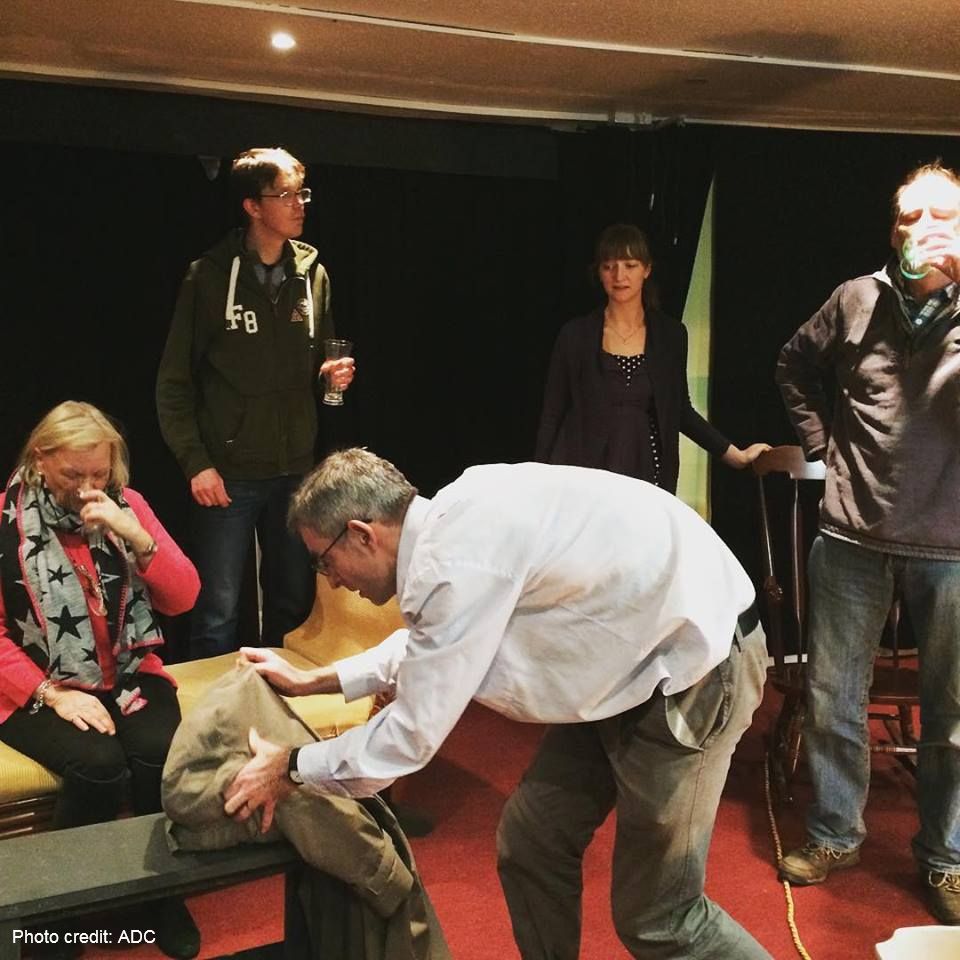 Theatrical manoeuvres in the dark: Brinsley (Rich Damerell, front centre) conceals a borrowed antique from Harold (David Fardon, back left), while Miss Furnival (Lynne McClurg-Smith, front left) and Colonel Melkett (Adam Blake, back right) down the wrong drinks, watched by Carol (Rachel Tranter, back centre). Picture from rehearsals. Matters become more complicated as Brinsley's ex-girlfriend Clea (Rebecca Peberdy) first phones Brinsley, then turns up at the flat uninvited, while the blackout continues. Clea is fully intent on getting back together with Brinsley and attempts to seduce him in the dark with the oblivious Carol standing next to them. Brinsley is terrified that Carol will find out and call off their engagement. But all might just work out...if he can keep the flat in total darkness. Colonel Melkett keeps flicking on his cigarette lighter, though, and then the man from the electricity board, a German named Schuppanzigh (John Hawkins), arrives and turns on his torch. Farcical hilarity ensues. Of course, it was never going to last, and Brinsley is exposed. A furious Harold ends their friendship when he discovers his possessions have been borrowed. Colonel Melkett and Carol are livid at Brinsley's two-timing her with Clea. When Mr Bamberger does turn up, he ends up falling down the the stairs into the cellar. The play ends with the colonel and Harold seizing parts of Brinsley's latest sculpture and proceeding to give him a damned good thrashing with them! So let's look at the production. Director Susi Dalton was blessed with a strong cast. Full disclosure – I've performed with Rich Damerell previously, but his portrayal of Brinsley Miller is the best thing I've seen him do. He managed to inject the role with the right levels of manic energy and strategic grovelling. Rachel Tranter was superb as Carol Melkett. She gave us a dippy deb par excellence whose loyalty to Brinsley was rock firm in spite of all the warning signs and the madness. Until the exposé of his relationship with Clea, that is. Lynne McClurg-Smith's lovely vignette of Miss Furnival must have been fun to play. In one of the many very funny scenes of the piece, the drinks of Harold, the colonel and Miss Furnival were swapped in the darkness, and the teetotal spinster ended up downing several Scotches. Lynne's comic tirade against bikers in leather jackets was hilarious. The role of Colonel Melkett could have descended into a mere stereotype – a pastiche of a retired army officer. Fortunately, Adam Blake restrained himself and we had a glimpse of his relationship with his daughter and of the colonel as a human being. That was in addition, of course, to his rolling round on the floor after repeated mishaps with a rocking chair that wasn't there before! David Fardon was a suitably camp Harold Gorringe, whose interest in Brinsley is more than platonic. This was not the full high camp of Sandy and Julian, but it nodded in that direction several times. Full disclosure again – David and I have shared the stage on several occasions, and I've noticed that his recent performances have shown a greater depth and range. I think that finally he is getting some decent direction, so kudos to Susi Dalton too. Rebecca Peberdy impressed me as Clea. A wonderful counterpoint to Carol, Rebecca's Clea was fun, flirty, bohemian, sexy and not a little crazy: a ball of energy that Brinsley cannot resist. There were nice cameo performances from John Hawkins as the electricity man Schuppanzigh and Michael Ward as Bamberger. Schuppanzigh, as a fellow German, is initially mistaken by Brinsley et al for Bamberger the millionaire. Schuppanzigh is clearly over-qualified for his job and shares his critical assessment of Brinsley's latest sculpture to everyone's delight. Until, that is, they discover his true identity and rage against him for their own mistake. It's a great role and John appeared to relish every moment of it.
It would be wrong not to mention the set design and construction. Those familiar with the restrictive space of the Unicorn Theatre will know that there is an unused balcony over the stage, normally accessible only by a ladder. What a waste! Thankfully, ADC have bitten the bullet and built a full staircase, stage left, which enabled them to use the balcony as Brinsley's bedroom. Susi Dalton was therefore able to run scenes with simultaneous action on stage and above it. I hope, and assume, that it will be used in future productions. Black Comedy is a well written piece of theatre, with a strong structure and original concept, but that does not guarantee that it will automatically result in a good production. For that, we need a cast, crew and director who are able to grapple with the complexities of this challenging play. I'm pleased to say that ADC fitted that job description. Well done to all. Photo credits: ADC HAIRSPRAY (Book by Mark O'Donnell & Thomas Meehan, music by Marc Shaiman, lyrics by Scott Whittman & Marc Shaiman) Our Lady's Abingdon 12-14 February 2019 Full credit to the members of the cast and crew for staging this challenging show, yet it was a somewhat strange choice. Hairspray takes place in a very particular historical setting, the USA in the early sixties, and has as its background the racial segregation of that time. Although the production tries to cast the underlying message of the show in terms of universal values of 'tolerance' and 'acceptance', the specific social circumstances of America in the 1960s, and the powerful sense of place engendered by the music and dress of the time, somewhat undermine that universalism. It therefore runs a risk of becoming a period piece. One work-around is to emphasise, instead, the fun and and fantastical nature of the storyline, and to aim the production's focus on the music, undoubtedly the show's strongest suite. I'm glad that director Dr Elizabeth Lawson chose to do so. The plot follows the fortunes of schoolgirl Tracy Turnblad (a great performance by Isobel Morris) who desperately wishes to appear on TV in The Corny Collins Show (the show's groovy eponymous star played by Endre Bessenyei). She makes it there and is smitten by the show's heart-throb Link Larkin (Freddie Lee in show-stopping vocal form, especially in the number 'Without Love'). Along the way Tracy comes up against the show's wicked producer Velma Von Tussle (Eve Wright as the ghost of Joan Crawford come back to life) and her daughter Amber Von Tussle (Isabella Allen, convincing as the jealous, petty, pouty, spiteful, rival for Link's affections). The plots twists and turns in quite unbelievably ways, and by the beginning of the second act, half the cast are in the women's penitentiary, singing the number The Big Doll House, which was a great way to get things going again after the interval. Other individual performances in particular that caught the audience's notice were Scott Burgess Martos, padded out as as Edna Turnblad, Tracy's plus-size mother, and Ellie Chan as the larger than life Motormouth Maybelle. Zephyr Acworth and Enya Hagan also impressed as Seaweed Stubbs and Little Inez This was a show with a large cast and some big chorus numbers, and the dozens of students each deserve congratulations for their part in some slickly choreographed pieces (as well as some efficient entrances and exits). The performance space itself was not that big. The space was further reduced by the choice to divide the main stage into two locations: the Turnblad household and the TV studio. Accommodating up to sixty actors on stage in such a restricted environment was challenging, but Elizabeth Lawson blocked things so that it never seemed crowded. The construction of a balcony to give a split level both eased the on-stage population density and gave the musical dance numbers a welcome extra dimension. Credit also due to Miss Page for the choreography. Praise is also due to the show band, who handled some extremely challenging musical pieces with a smoothness and professional sound that belied their years. The music was the core appeal of the show, with a string of great songs, so having such a strong instrumental ensemble as the motor beneath the bonnet was a a great asset for everyone. Well done to musical director Neil Farrow for pulling it all together in a small and overcrowded minstrel's gallery above the stage. Photo credit: OLA I'M AN IMPROVISER - GET ME OUT OF HERE!
House of Improv Michael Pilch Studio Theatre, Jowett Walk, Oxford OX1 3TS 30 January to 2 February 2019 I'm an Improviser – Get Me Out of Here! is the latest show, made up on the night as they go along, from House of Improv. The setting this time was a reality TV show along the lines of Big Brother. The contestants had been in the house for the past six weeks and now we had reached the final evening. Who would be the winner? But first, just who were the contestants and what was the grand prize? What else would one do in an improvised show but ask the audience? So, before the show began, we all had to scribble down our suggestions and put them in a variety of hats being proffered by cast members. The prize they were all competing for was to be President of the Moon, and the characters turned out to be Augustus (Emma Hinnells), know as 'Stus' for short. He described himself as having attended a rough, deprived, inner-city London comprehensive called Westminster School. Emma has a gift for bringing cheeky insouciance to her characters and gave us a Stus who was utterly without scruples. A memorable moment was when Stus voted out of the house Sebastian (Eliza McHugh), with whom he'd just that moment been to bed, describing the experience, while standing next to Sebastian, as 'unsatisfying'. Sebastian the Angry Vegan, to give him his full name, was clearly someone with unresolved issues. He believed that animals were superior to humans, and vegans were superior to the rest of the human race. Eliza's characterisation of Sebastian started angry, but became more desperate and demented as the show went on. This was a ball of uncontrolled energy that raised more than a few laughs. Then there was Jane Doe (Vidy Reddy) who had lost 'her' memory following an accident. Jane soon decided to change her name to Janice, and fell romantically for Buttercup (Kilian Lohmann), a southern belle from Georgia, USA, whose delicate, high-pitched voice turned into a sinister gravelly roar when she was roused. Kilian is a tall guy, and this clashed in a gloriously comic way with the obviously demure character of Buttercup. I enjoyed the Jekyll and Hyde nature that he brought to the part. Steve the Dragon (Amy Kennedy) was the online handle of a Dungeons and Dragons fanatic. Steve was the geeky sort of character you'd expect, with a sympathetic naivety about him. Dave Burns (William Jefferson) was an Australian health and safety guy, obsessed with writing lists, and clearly unable to interact socially, other than through reading out lists and making rules for everyone else. He also proved the ancient Roman adage 'nomen est omen', as he liked to burn things, a disturbing habit that William turned to fine comic use throughout the show. But even Dave found love... with Janice after her split up with Buttercup. Finally, Hannah Williams was the host and presenter of the show. She had the job of interacting with the audience and providing some structure and shape to the performance. Before getting into the action of the last night in the house, we had a flashback to the contestants' auditions, and yet another flashback to the highlights of the past six weeks. We had the locations you'd expect in a reality show set in a house: the diary room, where frustrated contestants vented their fury at their house mates. The kitchen, where Dave Burns pinned up his list of rules. The jacuzzi, where couples looking for a bit of love action constantly had others walking in on them right in the middle of... Most inventively, there was the Moon Room, a zero-gravity chilling out space. Stus and Sebastian rigged a competitive game in the Moon Room by placing weights in the other contestants' shoes. This cheating provoked Dave Burns to burn their things on a bonfire, assisted by Buttercup, who thereby discovered the joys of pyromania. In the end, Stus became President of the Moon, his ego bloated even more by the utterly undeserved honour! To expect a well-structured credible plot from impro is asking a bit much, so you won't get it retold by me. It also misses the point about the nature of the form: the comedy often derives from the inspiration of the moment, albeit a practised and rehearsed inspiration, and the chemistry between performers who can play to each others' strengths to produce occasional flashes of comedy magic. Well deserved pats on the back to co-directors Emma Hinnells and Hannah Williams for enabling this collaborative effort. Praise also to Matthew Kemp on keyboard who jollied the whole thing along in the manner of a silent movie accompanist. The audience clearly enjoyed the show, which succeeded in maintaining its surreal momentum right through its hour and a quarter run. That's no mean achievement with improvised comedy. The danger with this format is that there will be a sag in the energy and inventiveness somewhere in the middle. House of Improv avoided that trap and provided some laugh-out-loud moments for the present writer and his fellow audience members. |
About the Author
Mike Lord has been involved with amateur theatre for over twenty years, mainly as an actor but also, more recently, as a director. Archives
July 2019
Contact me
Please use the Contact Form for anything apart from comments on blog posts. |
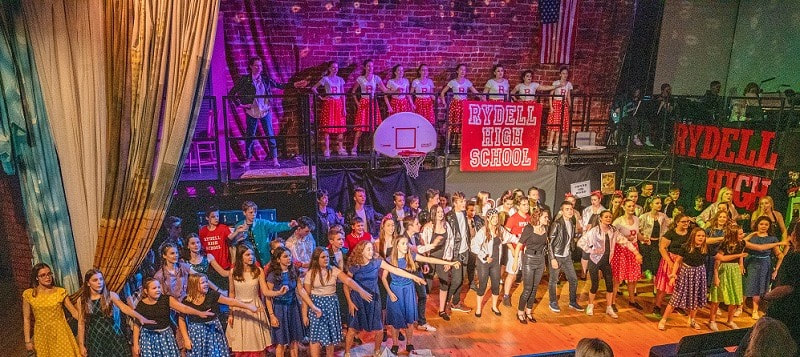
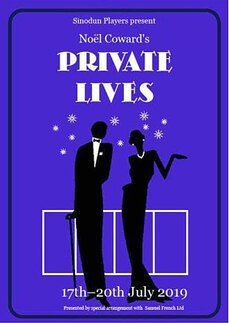

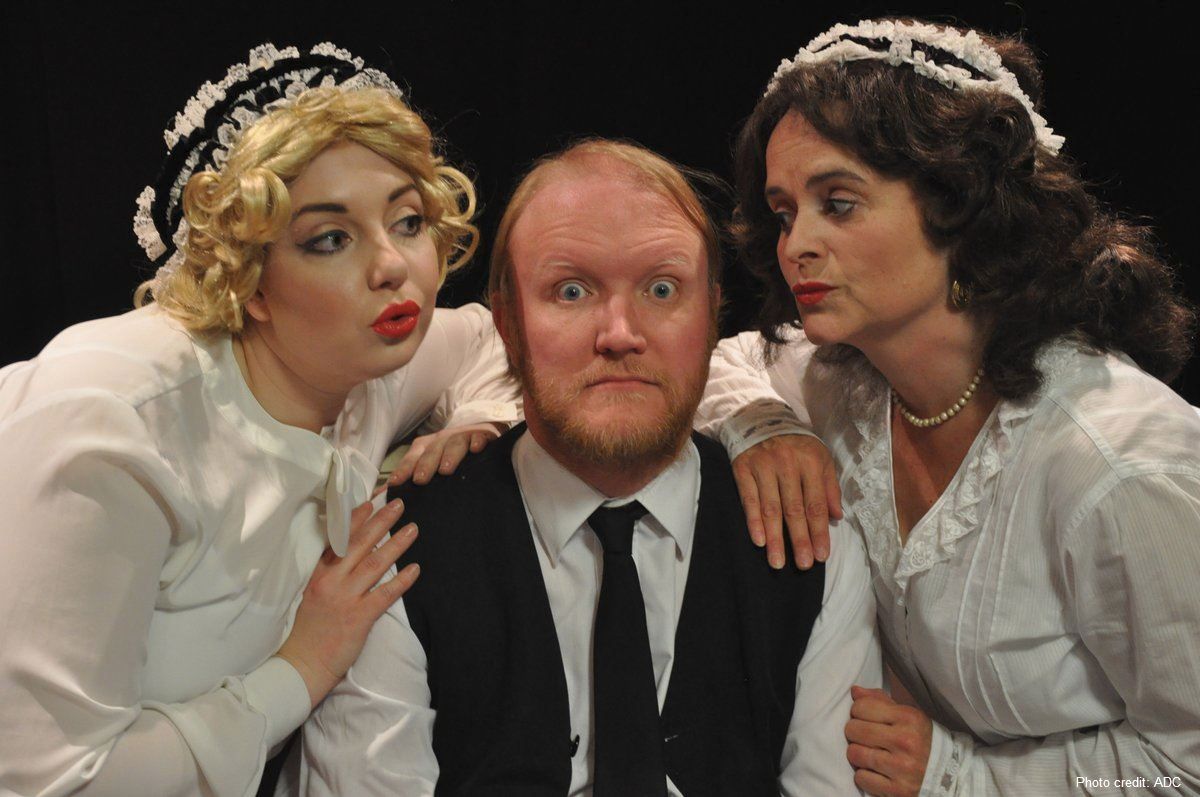
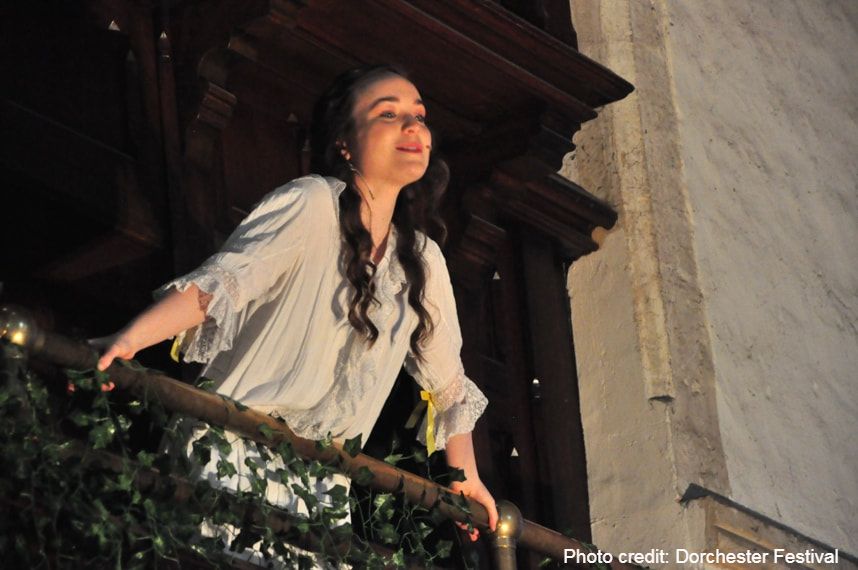
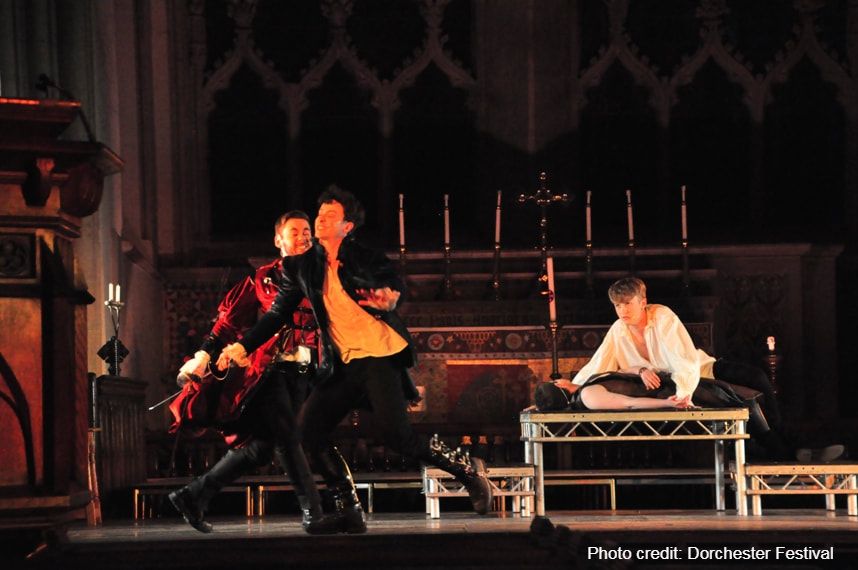
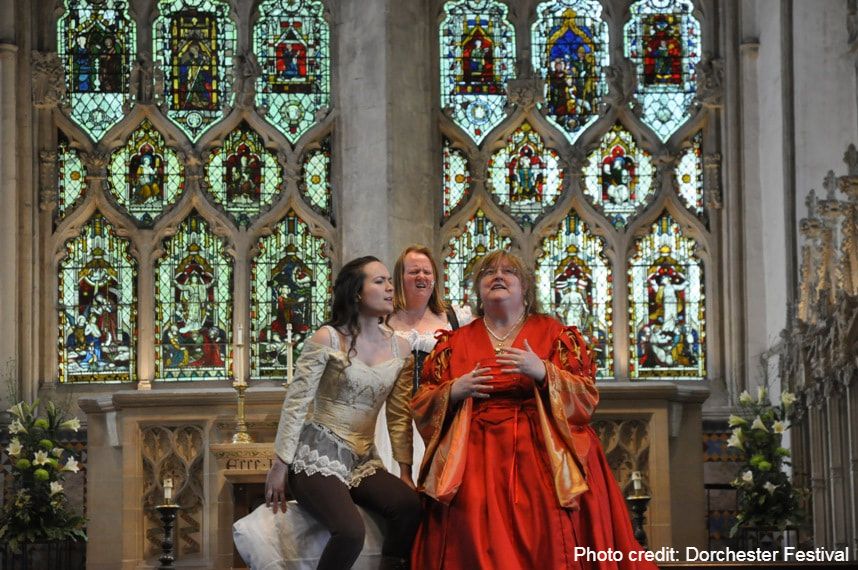
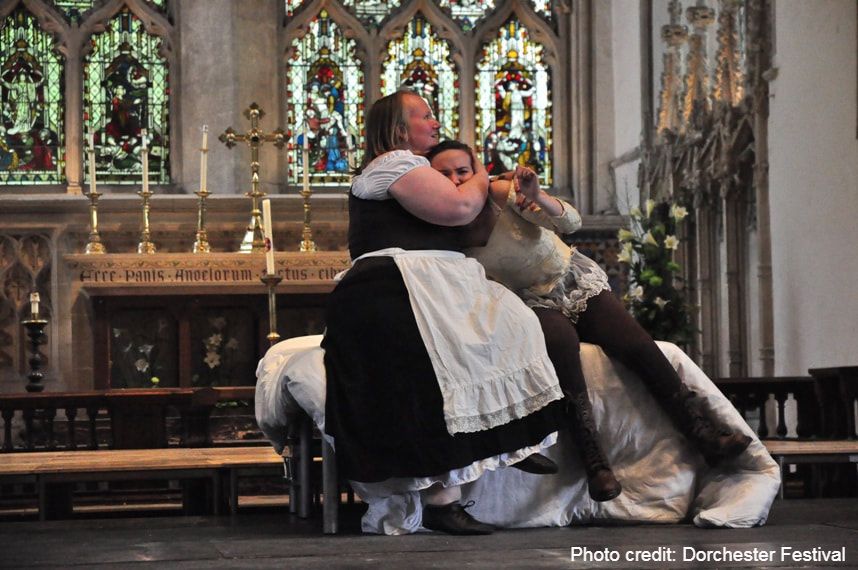
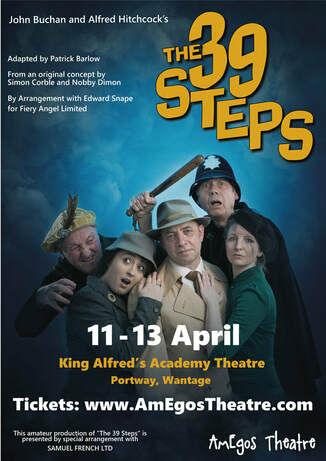
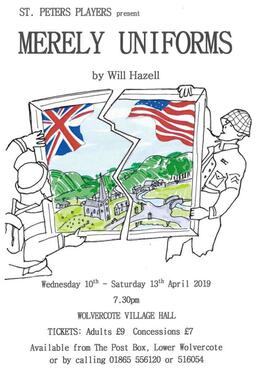
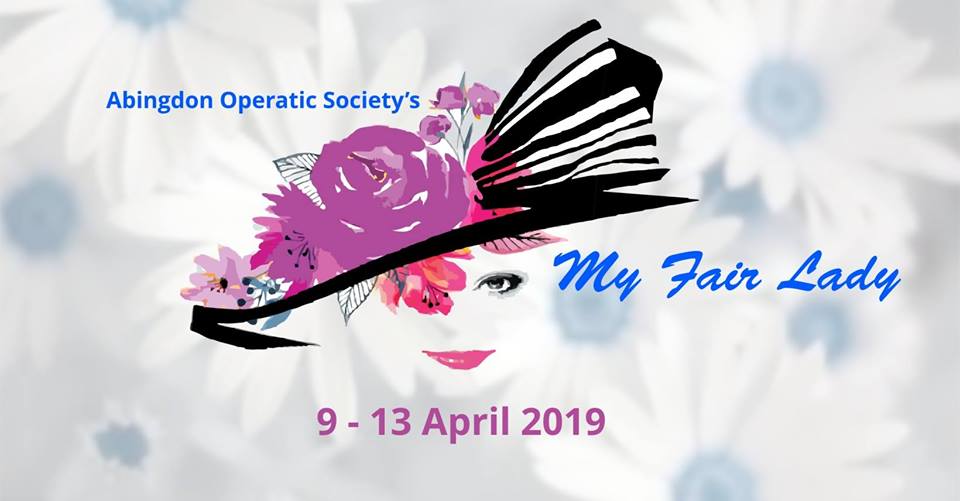
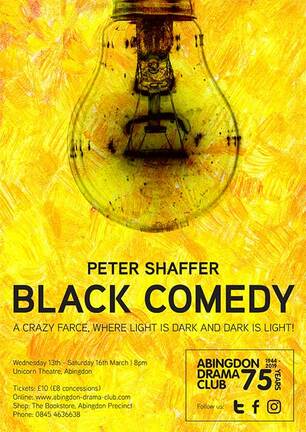
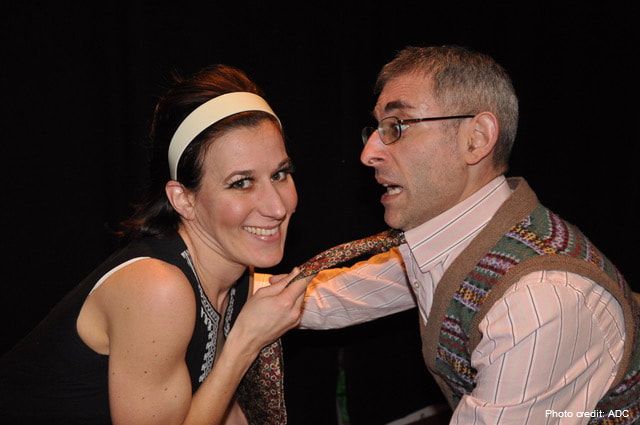
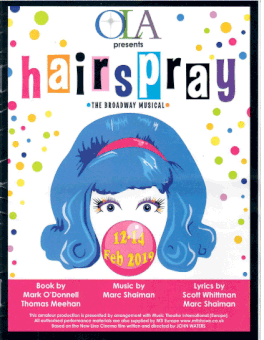
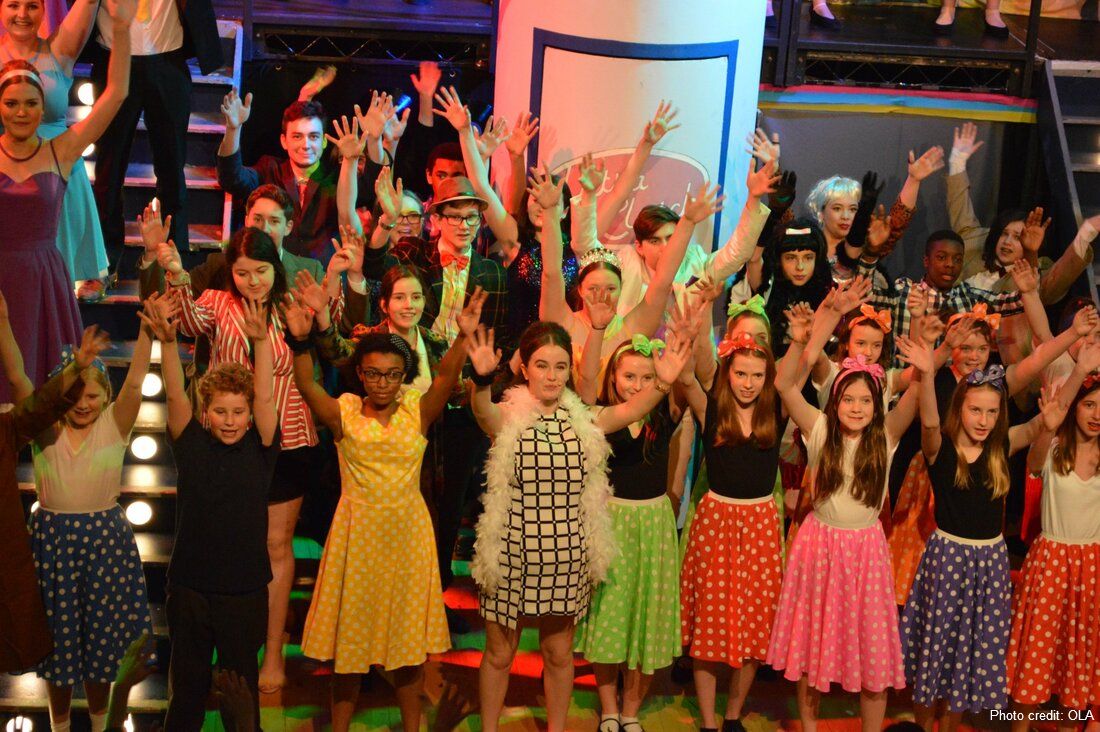

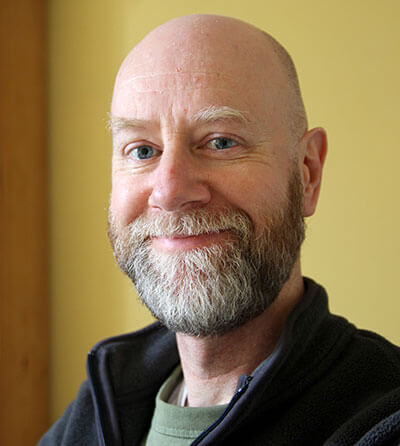
 RSS Feed
RSS Feed
